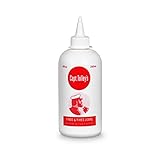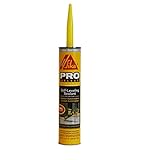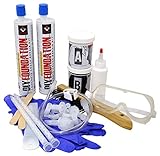10 Best Concrete Crack Sealer of February 2026
List of Top Rated Concrete Crack Sealer from thousands of customer reviews & feedback.
Updated On Feb 2026
2,089 Reviews Studied

- No tooling required, levels itself
- Water immersible after cure
- Able to bridge gaps up to 1.5 in. wide
- Paintable, stainable, sandable
- Flexible and durable

- NO DRILLING REQUIRED – The low-pressure injection method eliminates the need for drilling.
- HAIRLINE CRACKS – Low-viscosity, 2-component, injection urethane is suitable for the repair of hairline cracks.
- NO NEED TO EXCAVATE – Save serious money by repairing the crack from the inside.
- NO SPECIAL TOOLS REQUIRED – Use a standard caulking gun to inject.
- PERMANENT - Prevents water seepage permanently! Imperious to water vapor, soil gases, and even radon.

- Self-leveling formula - no tooling required
- Flexible bonds - use on expansion joints
- Withstands joint movement without distortion or failure
- Withstands a wide range of weather conditions; virtually unaffected by extreme temperature changes
- Blends in with surroundings for a professional finish
- Paintable
- Complies to stringent federal and state regulatory requirements
- For use on driveways, sidewalks, garage floors
- It cures in place to form a highly resilient and abrasion resistant seal. Resists deterioration caused by weather, stress, movement and traffic
- Its abrasion and tear resistance makes it ideally suited for applications exposed to pedestrian and vehicular traffic
- Recommended for repairing sidewalks, concrete floors and decks, garage floors and driveways
- Low VOC formulation, meets stringent State and Federal Regulations
- Withstands a wide range of weather conditions; virtually unaffected by extreme temperature changes

- Liquid cement crack filler is an easy to use, ready mixed product for the repair of cracks in concrete
- Repairs are ready for traffic in 30 to 45 minutes
- Self leveling and dries gray to match most existing concrete
- Interior and exterior use
- 1-Quart

- It is easy to use
- It is highly durable
- Manufactured in China

- The product is 10.1OZ Concrete Caulk
- Elegant and smooth finish
- The product is manufactured in China
- 10.1 oz cartridge great for larger or multiple jobs
- Great for patching sidewalks and steps
- Great for repairing brick mortar
- Textured finish blends great with motor
- excellent outdoor durability

- Two-part epoxy adhesive paste to fill and repair cracks in concrete, and to anchor threaded rods, bolts, and dowels into concrete, grout-filled block, and unreinforced masonry
- High-tack paste resists moisture for application in damp environments and can be used in vertical applications
- Can be used in indoor and outdoor applications with an application temperature range from 35 to 115 degrees F and a service temperature range from -20 to +115 degrees F
- Provides work time of 20 minutes and cure time of 4 hours (at 75 degrees F)
- Meets ASTM C881-99
- Formulated for anchoring threaded rods, bolts, rebar dowels and smooth dowels into concrete, grout filled block and unreinforced masonry.
- PC-Concrete is excellent for filling and repairing cracks in concrete, and out-performs all caulks and hydraulic cements.
- PC-Concrete will not come loose from any cleaned concrete surface and will hold during expansion and contraction of concrete.
- PC-Concrete is the best solution for permanent concrete repair.

- TWO SHADES of GRAY to choose from - (GRAY & LIGHT GRAY)
- FLEXIBLE in HOT & COLD WEATHER
- FILL CRACKS UP TO ONE INCH WIDE
- SEALS CRACKS to PREVENT further damage
- MADE IN THE U.S.A. DIY - FAST & EASY TO APPLY

- Sold as "Sashco 16210 Slab Concrete Crack Repair Sealant, Gray, 10.5 Fl. Oz (Pack of 1)"
- Easy and simple use kit
- The product is manufactured in China
- Superior concrete adhesion
- Designed to withstand foot and vehicle traffic
- Spans gaps up to 3" wide with no slump
- Combines the durability, flexibility and adhesion you need for lasting concrete crack repairs
Concrete Crack Sealers: Shopping Guide for Important Considerations
Concrete crack sealers are important if you want to maintain the beautiful appearance of your concrete. They come in different types and variations, so you must know what you need before purchasing them online or from a store. This article will help guide you through this process by introducing concrete crack sealers, their importance and advantages, and important things to consider while shopping for them.
What Are Concrete Crack Sealers?
Concrete is a tough material, but it's not indestructible by any means. It can be damaged if overused or under-maintained, which leads to cracks that weaken the integrity of your structure. These are common issues with concrete surfaces and not just limited to commercial applications—residential homes may have similar problems.
Concrete crack sealers are a specialized type of sealant designed to fill and protect the cracks in concrete from moisture and other environmental damage. They can be either an acrylic-based or polyurethane-based material, and each has its advantages and disadvantages. It's important to consider all the factors involved when choosing a Flagstone Sealer or concrete cracks sealer, like climate and weather conditions in your area, the severity of the cracks, and the type of surface you are sealing to make the best decision for your particular application.
Best Types Of Concrete Crack Sealers To Consider
When shopping for a concrete crack sealer, a homeowner will likely have a few things in mind that they want to find, like making considerations for Engine Block Sealers and Transmission Leak Sealers. It's important to know what kind of concrete you have before buying any sealer. If the sealant doesn't bond well with the concrete, it will peel and flake off over time. There are three important types of sealers to consider :
Permanent or acrylic sealers form a hard, shiny surface that can be walked on. They're usually used for driveways, sidewalks, and other surfaces that must be sealed and maintained frequently.
Semi-permanent or asphaltic sealers penetrate the surface of concrete, allowing it to expand and contract without cracking. They are used on patios, pool decks, garage floors, sidewalks, slabs below grade (beneath ground level), porches over, and garage floors.
Reversible sealers are a type of asphaltic sealer that can be applied one way for a harder finish or the other way to create more porosity and allow moisture to escape. They're used on driveways, sidewalks, and patios.
Conclusion
Concrete crack sealers are an important part of any concrete maintenance regimen. By sealing cracks in your concrete, you can prevent water and other debris from seeping into the substrate and causing further damage. In addition, properly sealed cracks will look nicer and last longer than unsealed ones. Concrete crack sealers are designed to stop the growth of cracks and provide a smooth surface. There is no single type that can be used for every application; we must understand the different types available in the market to make the right choice.





